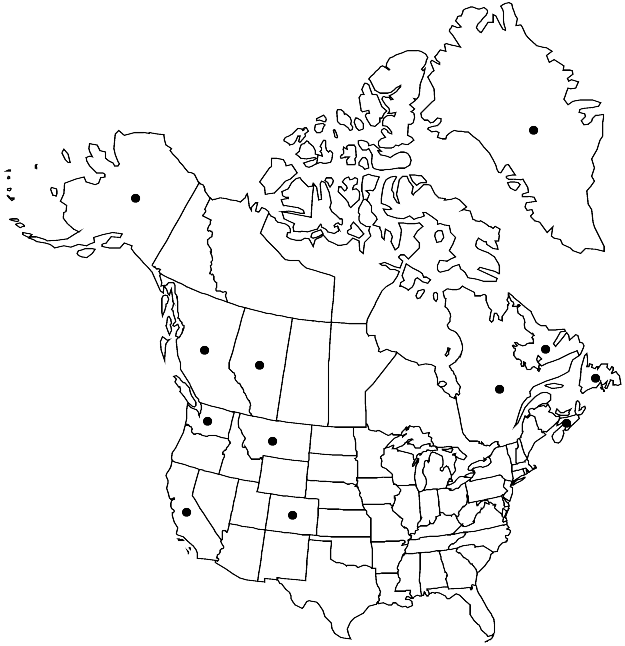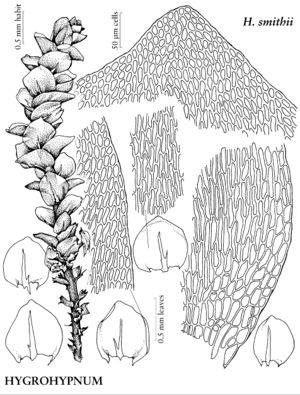Hygrohypnum smithii
in H. G. A. Engler and K. Prantl, Nat. Pflanzenfam. 231[I,3]: 1039. 1908.
Plants very coarse and stiff, dark green, olive green, or black, all with or without golden green or golden brown mottling. Stems to 8 cm, denuded proximally or with persistent, shredded bases, unbranched or irregularly branched; hyalodermis absent, epidermal-cells small, walls thick, similar to subadjacent cortical cells, central strand well developed. Leaves stiffly and loosely imbricate to erect-spreading, straight, sometimes secund, shrinking and twisting when dry, spreading when moist, usually broadly ovate, elliptic, or orbicular, sometimes ovate, transverse, or triangular, plane or shallowly concave, (0.6–) 0.8–1.2 (–1.5) × (0.4–) 0.6–1.2 (–1.4) mm; margins plane, entire or weakly denticulate; apex usually obtuse or rounded; costa stout, single to 3/4 leaf length, often 2-fid, occasionally double and short; alar cells few, quadrate to rectangular, region not clearly differentiated; basal laminal cells usually longer, wider than medial cells, walls more incrassate, yellowing; medial cells rhomboid, fusiform to short-fusiform, or linear-flexuose, 22–48 (–64) × (4–) 5–7 (–10) µm; apical cells rhombic or rounded; marginal cells often in ill-defined border of short cells. Sexual condition autoicous; perigonia and perichaetia not in bracted complex; perichaetial inner leaves lanceolate, plicate, margins recurved, entire, teeth few or absent at apex, apex acute or obtuse, costa single, strong. Seta red or brown, 0.8–1.7 cm. Capsule with endostome cilia 1–3.
Habitat: Irrigated to emergent acidic rock in montane streams, rock, wood, in slow moving water or ponds
Elevation: moderate to high elevations (500-3100 m)
Distribution

Greenland, Alta., B.C., Nfld. and Labr., N.S., Que., Alaska, Calif., Colo., Mont., Wash., Europe, Atlantic Islands (Iceland)
Discussion
Hygrohypnum smithii is a well-defined species, easily recognizable by the coarse, rigid habit, usually broadly ovate to orbicular leaves, and stout, usually single costa. The alar cells have incrassate, yellowing walls.
Selected References
None.
Lower Taxa
No values specified."narrower" is not a number.
